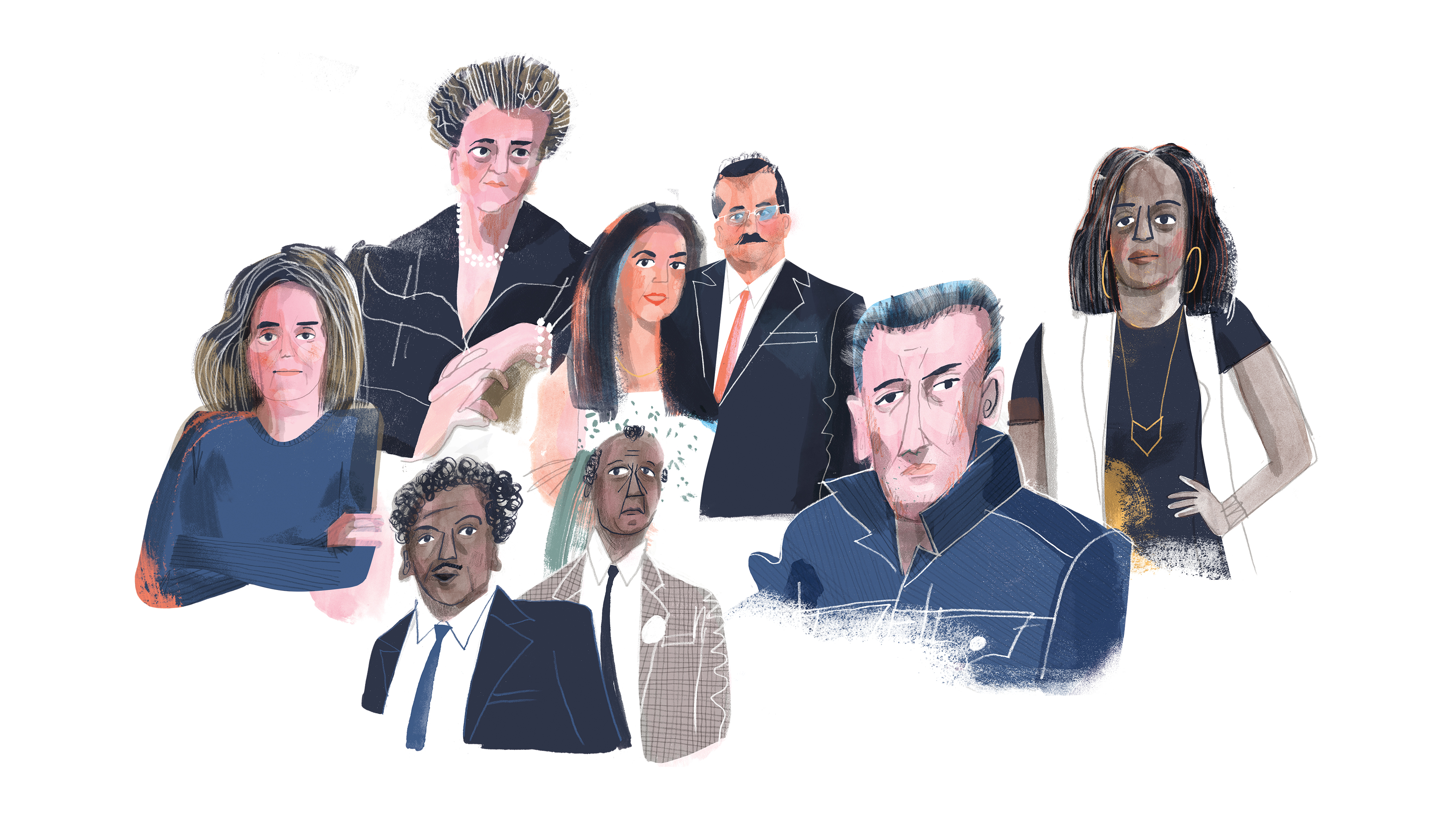
Introduction by Dean David Weil
As the Heller community seeks to address social policy questions that will shape the next decades, it’s essential to ground ourselves and look back at those who have fought for social justice in the past. We all find resonance and inspiration from different people. We hope all members of the Heller community will share their heroes as we approach our 60th anniversary next year.
It’s important to see how our social justice heroes navigated the challenge of achieving social justice goals, given the realities of the world they lived in and the resources they had to do so. We always think the social problems of today are the worst we’ve ever faced. I think there’s a certain humility that comes from looking back in time and realizing that every generation has grappled with difficult and complicated social problems, and then sought to overcome them. It says to us: Keep moving and striving, as difficult as times may seem. As Martin Luther King Jr., a social justice hero of mine, said, “The arc of the moral universe is long, but it bends toward justice.”
I hope reading about our social justice heroes will inspire a dialogue about the Heller School’s research and academic missions: What are different conceptions of social justice that drive us? How do we seek to deeply understand the social policy problems facing us? What avenues — from organizing to educating to legislating, to leading public, private and nonprofit institutions — do we need to address them? How do we use rigorous and hardheaded analysis of complex societal problems to advance social justice principles?
Rose Shapiro and Frances Perkins
Dean David Weil
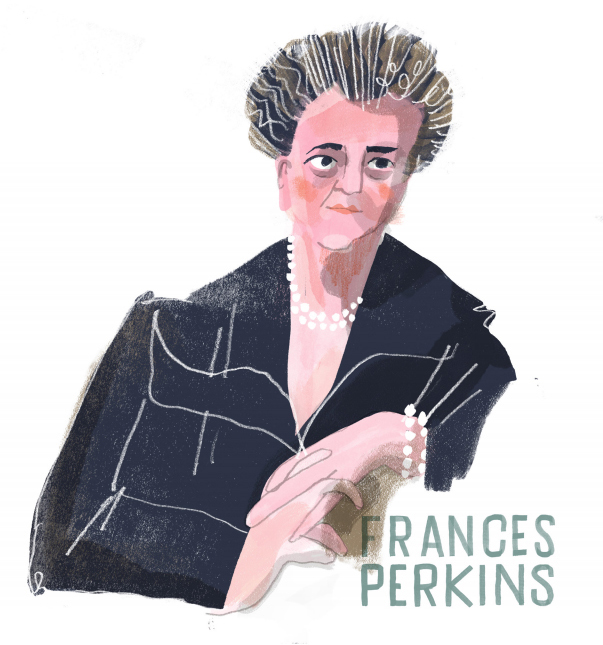
I’m sharing two of my social justice heroes today. The first is my grandmother, Rose Shapiro, who had a classic Jewish immigrant story. She arrived as a 15-year-old in New York City in 1905 with nothing. Her father had died, and her mother saw no future for her daughter in Russia. My grandmother worked in the garment industry in the era of the Triangle Shirtwaist Factory fire, and became a vocal supporter of unions, social progressive movements and civil rights. Until the day she died in her 90s, her personal experiences led her to have empathy for the vulnerable in society and the quest for greater justice for them in society. Her optimism and dedication to social justice continue to inspire me.
The second is Frances Perkins, the first woman to serve as a member of a U.S. president’s Cabinet. Early in her career, Perkins was appointed to a panel to investigate the causes of the Triangle Shirtwaist Factory fire. She later became an influential adviser to Franklin Roosevelt, and when he became president, he appointed her secretary of labor. She was bold and creative in thinking about the systems necessary to deal with the effects of the Great Depression. She played a critical role in the creation of the National Labor Relations Act, the Social Security Administration and the Fair Labor Standards Act (which established the agency I led during the Obama administration, the Wage and Hour Division). At the time, these ideas were revolutionary: a minimum wage, child labor laws, a pension system for the elderly, formally recognizing unions in the workplace. Though fueled by a social justice vision, Perkins was also politically deft in her ability to push Roosevelt to turn bold ideas into legislative and administrative reality. Combining a vision of justice with the knowledge and skills to make things happen is something I deeply admire.
South African Student Activists
Ziyanda Stuurman, MA SID’20
My social justice heroes are the South African students who mobilized and led the #RhodesMustFall and #FeesMustFall movements between 2015 and 2017. Those movements fundamentally changed the landscape of higher education in South Africa; they began the real and deep work of transformation and decolonization of campuses and curricula across the country’s 22 universities; and their efforts resulted in a fundamental policy change toward funding higher education for young people from poor and working-class communities. Without the many thousands of students who organized, protested and made change, so many other students would still face almost insurmountable odds in accessing a quality, decolonized university education. I am inspired every day by the fact that a small, determined group of students united and created an ocean of change.
A. Philip Randolph and Bayard Rustin
Jules Bernstein ’57, Heller Board of Advisors member
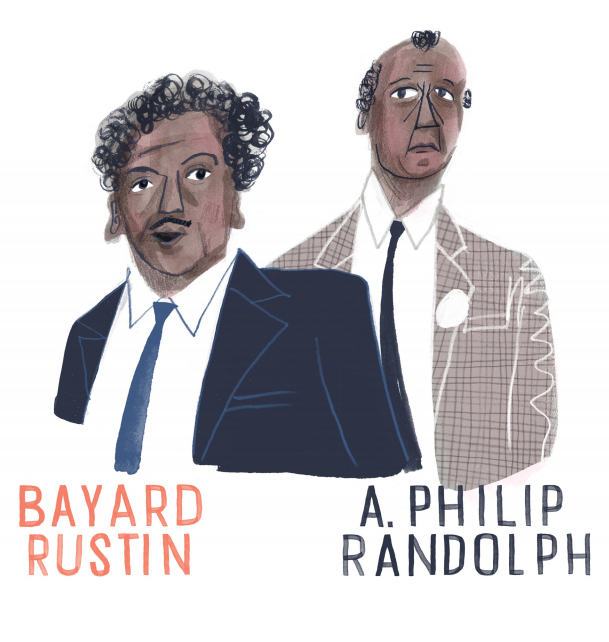
My heroes are A. Philip Randolph and Bayard Rustin, civil rights leaders who organized the 1963 March on Washington for Jobs and Freedom and had a major influence on progressive American history. They were principled, brilliant and fearless. I was lucky enough to have an insider’s view of their work. I worked with Rustin, and in 1963, I was there with him at the March on Washington at 5:30 in the morning, when you couldn’t see a single bus or person. Rustin spent time in prison for his civil rights work and was beaten mercilessly on many occasions — but he always came back and persevered. I had the opportunity to meet Randolph through my work representing major labor unions. Randolph, the head of the Brotherhood of Sleeping Car Porters, went toe-to-toe with three presidents — Roosevelt, Truman and Kennedy — which led to the desegregation of the defense industry and the military. I remember Randolph standing up at an AFL-CIO convention and saying they had to integrate the local unions. They were such incredible collaborators, and so effective as leaders. We need to keep growing more like them!
Martin Luther King Jr.
Associate Professor Rajesh Sampath
From the time I was young, Dr. Martin Luther King Jr. was my social justice hero. Who cannot possibly be moved by his passionate and stirring speeches about love, unity and overcoming hate and divisions in our society? Now, as a member of our school, which abides by the motto of ‘knowledge advancing social justice,’ I see Dr. King’s principles being lived out every day. Compassion, empathy and community bring people of different backgrounds together to find ways to overcome the world’s gravest social injustices. He was a great soul who had a vision for a different world, and I am inspired every day in playing my small part to see that new world become a reality!
Bruce Springsteen
Professor of the Practice Joanne Nicholson
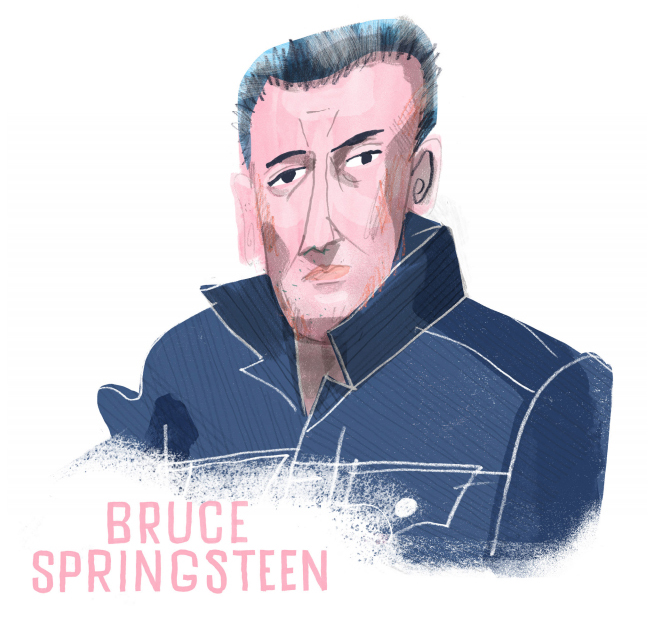
Bruce Springsteen is my social justice hero — not just because of what he does but because of who he is. Springsteen uses his gifts and talents to capture the events and issues that define the past 50 years, such as the struggles of the working class and the impact of increasing economic divisions, relationships, family, growing up and hometowns, identity issues, heartbreak, labor disputes, Vietnam, HIV, 9/11, the challenge of making sense of the world, freedom and responsibility, and what it means to be an American. Springsteen is a successful, skilled musician and writer who talks publicly about his depression. He writes about seeking professional treatment and the benefits he finds in talking therapy and medication. Springsteen writes about life with his father, diagnosed at one point with paranoid schizophrenia, and the streak of bipolar disorder that runs in his family. The stigma associated with mental illness is pervasive, but Springsteen provides examples of persistence and writes of hope.
Roupen and Annie Kiredjian
Marc Kiredjian ’05, Associate Director for Academic Affairs and Innovation
I’m a firm believer in the direct influence we as individuals have on the people around us, and how our actions speak volumes. It may sound clichéd, but my parents have served as examples of social justice activism in my life. Their parents were orphaned during the Armenian genocide; they had to navigate a conflict-ridden society as refugees without a home and create from scratch the notion of ‘family.’ After emigrating from Lebanon in the 1960s, my parents had to start from scratch again in the United States. Life was not easy for them during this time, but they worked hard, built careers and raised a family. Within this environment, we learned that while life may not be fair, we as individuals have the responsibility to advocate for fairness and justice for the people in our lives.
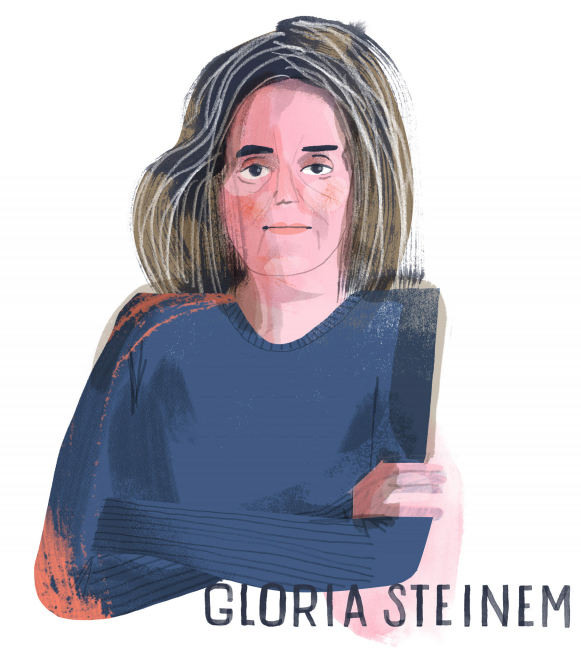
Gloria Steinem
Stephanie Tobler, MA COEX’20
My social justice hero is Gloria Steinem. When I started working in my 20s, the workplace wasn’t perfect, but it was pretty good. She and other women of her time made those breakthroughs for me and other women who are in the workplace today. That’s empowered me in my work on women’s rights issues — from my previous work with survivors of sexual assault to my new focus on the role of women in countering violent extremism.
Charles Hamilton Houston
Susan Eaton, Director of the Sillerman Center for the Advancement of Philanthropy
Civil rights lawyer and vice dean of Howard Law School Charles Hamilton Houston engineered the decades-long legal strategy that led to the unanimous 1954 Supreme Court decision Brown v. Board of Education. This repudiated the doctrine of “separate but equal” for black children and white children and helped ignite the civil rights movement. Houston inspires me because he worked so methodically and creatively, collaboratively and quietly, calling in numerous scholars and legal minds to bring racial discrimination cases that set precedents to make Brown possible. Educated at Harvard Law School, Houston was a devoted mentor to his African American students and colleagues at Howard (including Supreme Court Justice Thurgood Marshall). Together, they reshaped legal doctrine and training that continues to this day. He reminds me that social justice work requires a lot of different types of people. We understandably tend to remember the folks who lead the marches, who speak with eloquence to the largest crowds, and these days, who’ve mastered the Twittersphere. But Houston’s quiet conscientiousness, creative collaboration and hard work, all driven by values, remind me to keep moving forward, even when the nation seems to be rolling backward.
Muhammad Anwer and Sabina Abbasi
Bakhtawer Abbasi, MA COEX’20
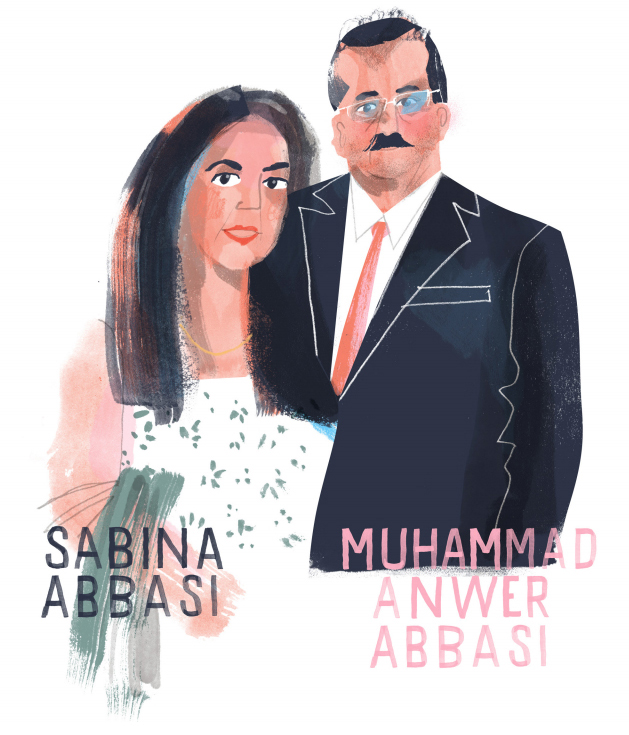
My parents, Muhammad Anwer and Sabina Abbasi, are my social justice heroes. Pakistan, where I grew up, is a highly patriarchal society, and there is a huge divide between the male and female genders. I’m one of three daughters, but my father didn’t treat us any differently. He gave us absolute freedom to study, to work. In his own way, it was his form of social justice for us. It all stemmed back to my mother, who reinforced the idea that we should be no less than anyone else, and therefore could and should grow up to be whatever we’d like to be. That has helped me to also look at equality in a broader sense: between different religions, genders beyond male and female, and the LGBTQ community.
Daisaku Ikeda
Anri Tanabe, MA SID/MS GHPM’17
Throughout my life, I have been encouraged by the life and writings of Buddhist philosopher, peacebuilder and educator Daisaku Ikeda. He is a person who has dedicated his life to the happiness of others, wholeheartedly encouraging each person he encounters based on a conviction of their innate worth as human beings. His activities toward peace stem from a belief in the power of heart-to-heart dialogue among people. He says, ’Dialogue is a bastion protecting human dignity against the assaults of violence, an essential force for the creation and expansion of peace.’ I truly believe that.
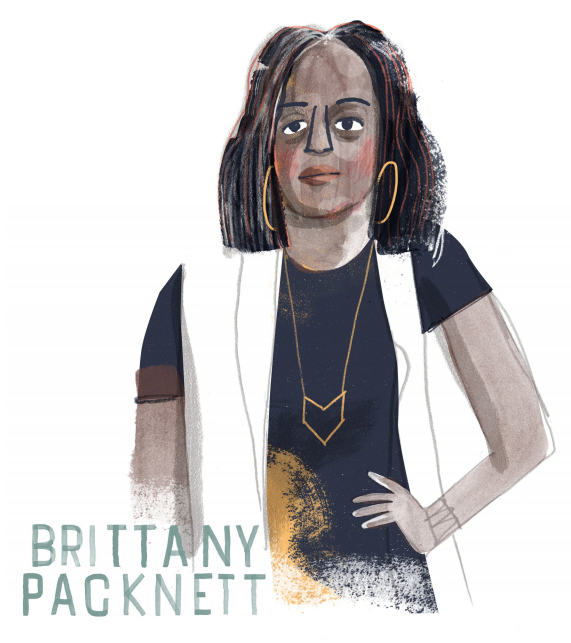
Brittany Packnett
Bria Price, MPP’19
My social justice hero is Brittany Packnett. She is an activist and educator who believes in the intersection of culture and justice. From the Obama White House to a community meeting in Ferguson, Missouri, she speaks the truth of her community, the nation and her ancestors. Packnett gives me hope that my voice, a natural blend between educated, authentic, Southern and open, can also bring truth to power and make a difference. She’s a political expert, educator, organizer and leader who not only pushes society toward justice but also toward ultimate liberation.
